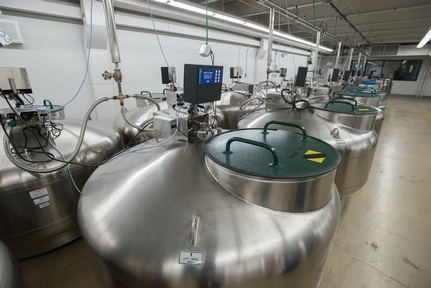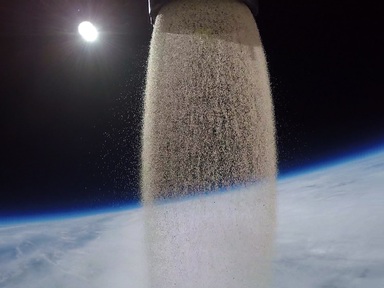Desire for immortality: Head freezing and space funerals
Humans have always hoped for life after death. The difference is that now our desire is becoming more achievable due to huge advances in science.

In the past, Egyptian slaves were executed to accompany their dead Pharaoh into the afterlife. Now, thousands of years later, an equally bizarre after death procedure is being carried out and all for the price of £5,000 for 250 years.
Yes, head freezing will be available in Britain within the next five to 10 years, according to the UK’s stem cell bank.
Celebrities such as Simon Cowell and Paris Hilton have expressed an interest in being cryogenically frozen, which is when a body is ‘frozen’ in liquid nitrogen shortly after death. The hope is that advances in technology in the future will mean the body can be brought back to life.
An American psychology professor called James Bedford was the first to be frozen in 1967. Nearly 300 people in the US have joined him, suspended upside down in tanks full of liquid nitrogen.
However up till now cryogenics has only been possible for the very rich.
Advances in technology making cryogenics affordable
Mark Hall, spokesman for StemProtect.co.uk said: “We’re accustomed to making jokes about freezing heads when we die. But soon we could see this practice becoming commonplace because advances in technology have made it much more affordable.
“And of course, while we’re not at the point yet where we can bring someone back to life from this procedure, we believe it’s just around the corner.”
There are currently only three cryogenics centres in the world, two in the US and one in Russia. Bodies are stored upside in large steel tanks, for safety reasons, as if there was a leak, the head would be the last part affected.
Last year, a fourteen-year-old girl from London who had a rare form of cancer, was cryogenically preserved, after she asked to be frozen until a treatment could be found. She is currently one of only a handful of Britons who have been preserved in liquid nitrogen.
However this could soon change, according to StemProtect.co.uk, which predicts head freezing will soon be cheaper than some funerals.
Currently doctors do not know how to bring a frozen body back to life, but some advances in science are already mind-boggling so we may soon be dealing with the ethics of bringing someone back to life. These include, would they have any memories from their previous life and what kind of world would they be living in if they were brought back to life in the future. Is it selfish to try and preserve people’s bodies when the world is already over-populated?
Space funerals
If of course you don’t want to spend your money on being suspended upside down in a liquid nitrogen tank in the hope that you may be brought back to life in the future, you can always blast your ashes into space.
A pioneering British space firm, Ascension Flights, is offering space funerals. Flights are filmed, with footage of the ash dispersing against the curvature of the earth and the darkness of space at an altitude of 35 kilometres. Any residual moisture in the canister freezes instantly, which creates a plume of glitter.

Co-founder Dr Chris Rose said: “We’re at the edge of the next space age, with private industry in the US on the verge of making personal space flight a reality. With the six living remaining astronauts now in their eighties, a new chapter that builds on their incredible achievements is opening.
“Many of the first generation of space fans intoxicated by space flight will never experience the thrill of looking back at the Earth and fulfilling their dream of space flight. Our new service enables families the opportunity to fulfil their loved ones’ dreams. We feel it’s the ultimate send off for a life well lived.”
The space pioneers are already in talks with some funeral directors in the UK and internationally to offer the service. The first flight, aboard the purpose-built Ascension 1 craft, is scheduled to take place in November. The emptied canister returns safely to Earth after dispersal and is fitted with a multitude of specialised tracking systems for retrieval.
Dr Rose added: “Fundamentally, we are all stardust, so this feels like a fitting tribute to those of us who have lived through the prologue to the space age.”
Natural burials
Those with environmental concerns will probably prefer the simpler, natural burial which is growing in popularity in the UK. There are now nearly 300 natural burial sites in the UK, with natural alternatives to heavy wooden coffins, ranging from simple linen shrouds to hand-woven willow caskets.
Regrets of the dying
While for people more interested in living a good life, it may help to read ‘The Top Five Regrets of the Dying’ by Bronnie Ware, a palliative nurse.
She found a very common regret to be ‘I wish I hadn’t worked so hard’ as well as ‘I wish I had stayed in touch with my friends’.
The top regret was ‘I wish I'd had the courage to live a life true to myself, not the life others expected of me’.
‘This was the most common regret of all. When people realise that their life is almost over and look back clearly on it, it is easy to see how many dreams have gone unfulfilled. Most people had not honoured even a half of their dreams and had to die knowing that it was due to choices they had made, or not made. Health brings a freedom very few realise, until they no longer have it.’
Latest Features News
 28-Nov-19
2019 Election: Labour pledges £10.8 bn for free personal care while Boris Johnson sidelines social care
28-Nov-19
2019 Election: Labour pledges £10.8 bn for free personal care while Boris Johnson sidelines social care
 18-Oct-19
Podcast: Wendy Mitchell and dementia: 'My biggest fear is not knowing who my daughters are'
18-Oct-19
Podcast: Wendy Mitchell and dementia: 'My biggest fear is not knowing who my daughters are'
 30-Sep-19
World's oldest diver aged 96 says 'never accept the fact you are getting old'
30-Sep-19
World's oldest diver aged 96 says 'never accept the fact you are getting old'
 27-Sep-19
Exclusive: Care minister backs care workers' call for time off to grieve and attend funerals
27-Sep-19
Exclusive: Care minister backs care workers' call for time off to grieve and attend funerals
 20-Sep-19
Podcast: Gyles Brandreth urges care workers to learn poetry with elderly
20-Sep-19
Podcast: Gyles Brandreth urges care workers to learn poetry with elderly